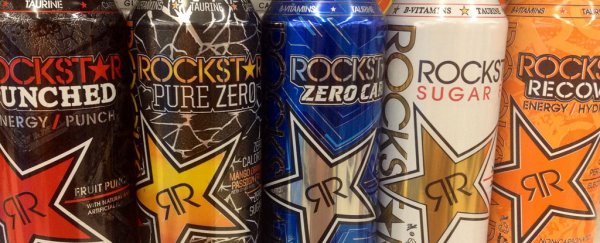The jury has been out on energy drinks for some time. The high amounts of caffeine in the drinks can be dangerous in large quantities, which is why health professionals – and these days the bottles and cans themselves – caution you should limit your intake to one or two drinks per day at most (a warning many people, especially young people, disregard).
But what else do energy drinks do to your body? To find out, researchers from the Mayo Clinic looked at the effects of consuming just one 480 ml (16 oz) energy drink, and their conclusion was alarming: the recorded increase in blood pressure and stress hormone responses were so significant that they could conceivably trigger new cardiovascular events.
"Energy drink consumption has been associated with serious cardiovascular events, possibly related to caffeine and other stimulants," the researchers write. "We hypothesised that drinking a commercially available energy drink compared with a placebo drink increases blood pressure and heart rate in healthy adults at rest and in response to mental and physical stress… which could predispose to increased cardiovascular risk."
To test their theory, the researchers gave 25 healthy volunteers aged 18 years or older a 480 ml can of Rockstar (pictured above) and instructed them to drink it within five minutes. The group had fasted beforehand and also abstained from alcohol and caffeine for 24 hours prior to the experiment.
On another testing day two weeks removed (in a random order), the same participants drank a placebo beverage designed to resemble the energy drink in taste, texture and colour – but lacking any of the caffeine or other stimulants found in the Rockstar drink, which includes 240 mg of caffeine, 2000 mg of taurine, and extracts of guarana seed, ginseng root, and milk thistle. Gotta love that milk thistle!
What the researchers found when they compared the results of the two drinking sessions was that consumption of the energy drink saw a 6.4 percent increase in average blood pressure.
Further, the average norepinephrine level – the hormone responsible for mobilising the body into action, especially with regards to the fight-or-flight response – increased from 150 picograms per millilitre to 250 pg/mL in those who consumed the energy drink, whereas the placebo elicited only a 140 pg/mL to 179 pg/mL increase (a 74 percent vs 31 percent change, as the researchers point out).
The authors concede that their study is small and is limited to measuring the effects of just one serve of an energy drink, saying more study is needed to measure how harmful these acute changes in stress hormone responses could be in the bigger picture. Nonetheless, the results they've already seen may be of concern – especially to those who consume energy drinks in large amounts.
"These acute hemodynamic and adrenergic changes may predispose to increased cardiovascular risk," the authors write. "Further research in larger studies is needed to assess whether the observed acute changes are likely to increase cardiovascular risk."
The findings are published in The Journal of the American Medical Association.
